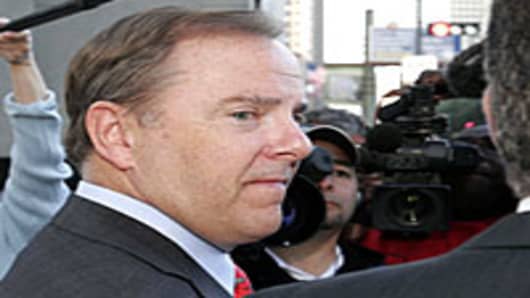Errors "permeated" the case against former Enron CEO Jeffrey Skilling, and he should be granted a new trial, Skilling's lead attorney argued before a three-judge appellate panel Monday.
But the government argued the errors were "harmless," and that one of the most notorious white collar fraud convictions in history should be allowed to stand.
The oral arguments before the Fifth Circuit Court of Appeals followed the Supreme Court's opinion in June that the government misused a federal law that makes it a crime to deprive an employer or shareholders of their "intangible right" to an employee's "honest services."
The high court ordered the appeals court to consider whether the error was serious enough to grant Skilling a new trial.
Skilling, who served as Enron CEO for six months in 2001 and abruptly resigned two months before the company began spiraling toward bankruptcy, was convicted in 2006 on 19 counts including conspiracy, fraud and insider trading. He is four years into a 24 year prison sentence, currently at a federal correctional institution in Colorado.
"Error permeated the government's case" against Skilling, defense attorney Daniel Petrocelli of O'Melveny & Myers argued in court, noting that jurors heard about the honest services theory-—which has since been invalidated by the Supreme Court—"no fewer than six times" during jury instructions.
Because it is possible that jurors relied on the flawed theory to convict Skilling, he should be granted a new trial, Petrocelli argued.
But federal prosecutor Douglas Wilson said it was clear the government was presenting a "simple conspiracy" case, primarily involving "securities fraud, and incidentally honest services fraud."
Wilson noted that in closing arguments in the case, federal prosecutors only mentioned the term "honest services" once, but they used words like "investing" and "investors" 112 times.
"The case against Skilling was a securities fraud case," Wilson told the panel, meaning that any use of the honest services statute was "harmless" error.
The honest services law has been a bone of contention in fraud cases for years. Prosecutors consider it a useful tool, but defense attorneys have long argued that it's unconstitutionally vague.
In June, the Supreme Court ruled the law applies only to bribery and kickbacks, neither of which Skilling was accused of taking. The Skilling case was the most prominent of three honest services cases thrown open by the high court in June. Also arguing for a new trial in different appeals courts are publishing mogul Conrad Black and former Alaska state legislator Bruce Weyrauch.
On Friday, a federal appeals panel overturned Black's convictions under the honest services law, but allowed two other convictions—for fraud and obstruction of justice—to stand.
Skilling did not attend Monday's oral arguments, which took place in the same courthouse where he and former Enron Chairman Kenneth Lay were convicted in 2006.
The appeals panel previously denied Skilling's motion to be freed on bail while his appeal is pending.
It is not clear when the appeals court will rule on Skilling's request for a new trial.



